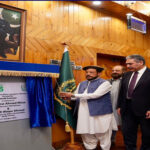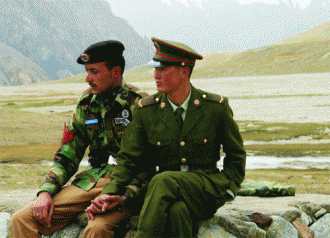The Pakistan Army knows Beijing needs its full support to secure the China Pakistan Economic Corridoor, which is part of China’s larger One Belt One Road project. It will use this as a tool to further marginalise the already weak civilian Government of Nawaz Sharif
The China-Pakistan Economic Corridor, a part of China’s transnational One Belt One Road initiative, is seen as an economic breakthrough for Pakistan. Huge stakes are involved. Trade, energy and geostrategic imperatives are driving both Pakistani and Chinese ambitions. The dominant thinking in Pakistan is that the CPEC, with a set of projects worth $46 billion currently under construction, will substantially improve Pakistan’s current fragile economic situation, as the project will bring about unprecedented changes in the lives of the people across the region.
China is not oblivious to the reality that Pakistan is one of those countries whose internal and regional troubles are so great that, should it collapse; the ripple effects would be enormous. Outlining Pakistan’s strategic vision at Chatham House, London, Pakistan’s Foreign Affairs advisor Sartaj Aziz has conceded that Pakistan’s regional geo-strategic landscape is going to be converted from a liability to an asset due to its close relations with China.
Thus China’s intention to invest so heavily in Pakistan, should be seen as an attempt to allow its ‘all-weather-friend’ to remain as a functional political entity. China is keen to integrate Pakistan into the system of regimes that Beijing has been assiduously constructing both geopolitically and economically. Pakistan’s civilian and military elite are aware that it will be difficult to govern their country and ensure financial stability without the assistance of China.
However, there is a wide gap between strategic aspirations and ground realities. Several obstacles have already begun to impede the smooth implementation of the CPEC. The current internal security situation in Pakistan is grim. Political and bureaucratic corruption is endemic and there is an absolute lack of consensus on the route of CPEC.
Domestic dimensions of CPEC are being fiercely debated within Pakistan. Major political parties of Balochistan and Khyber Pakhtunkhwa have challenged the corridor’s route, complaining that power projects that ought to be installed in their Provinces have been diverted to Punjab. In order to mollify the provincial resentment over allegations of discriminatory allocation of CPEC projects, Pakistan’s federal ministers are repeatedly saying that no discrimination is being meted out to both Balochistan and KP.
One of the perceived direct threats to Pakistan on geopolitical levels is India’s rising status. The major factor in closer Pakistan-China ties is that it provides a counter-balance to India in regional balance of power. With China by its side, Pakistan feels secure to promote itself as a regional power that is not afraid of India’s growing importance at the global level. In order to find a convenient scapegoat for its anticipated failures in CPEC, Pakistan’s ‘deep state’ is desperately trying to establish an Indian bogey.
Media analysts close to the security establishment are spreading a vicious propaganda that India is employing all means necessary to derail the CPEC so that China is prevented from attaining a larger presence in the Indian Ocean.
In a bid to appease the Chinese leadership, Pakistan’s Army Chief, General Raheel Sharif, has recently accused that India’s subversive activities in Balochistan are designed to undermine the CPEC. As a matter of fact, India is not worried much about the economic or strategic dimension of the CPEC.
What is troubling New Delhi is China’s brazen effort to challenge India’s sovereignty in Pakistan-occupied Kashmir and the Gilgit-Baltistan region, where important civilian and military infrastructure projects are being constructed in the CPEC. China wants to accord de facto ‘legitimacy’ to Pakistan’s illegal occupation of these areas.
The Gilgit-Baltistan region is not a Province of Pakistan, but directly ruled from Islamabad. It does not enjoy the constitutional status similar to other Provinces of Pakistan, and it does not have any representation in Parliament. After signing the CPEC in April 2015, there have been speculations that Pakistan is considering upgrading the constitutional status of Gilgit-Baltistan, bringing it one step closer to being fully absorbed as an additional Province. This move will satisfy China’s concerns over the legal status of its huge investment in Gilgit-Baltistan. If Pakistan decides to go ahead, it will mark a tactical shift of its Kashmir policy. Moreover, the territorial ambiguity of Gilgit-Baltistan will also compound the confusion that exists over sharing of revenues with this anomalous administrative unit.
Pakistan Army’s historical support for ‘ideological proxies’ has over the years led to a situation where some extremist organisations enjoy enormous clout and wealth. Without reining in these terror groups, Pakistan can never hope to secure the areas where CPEC related network of highways, railways, special economic zones, pipelines are being established. Without categorically rejecting terrorism as an instrument of Pakistan’s foreign policy, whatever successes its Army has achieved againstjihadi forces in recent year, they are fragile and reversible.
China is worried about the security of the CPEC and its nationals working in different projects. Beijing knows that the successful implementation of OBOR is an illusion without peace and stability in the region. Clearly, Pakistan’s domestic challenges have created a strong possibility of CPEC projects being subjected to unscheduled delays.
Thus, the Chinese are doubling their efforts to remove all hurdles in the realisation of its larger geopolitical ambitions of creating the Silk Road Economic Belt spread over a large part of Asia and Eastern Europe. China’s involvement in the Quadrilateral Coordination Group initiative to bring about peace in Afghanistan is dictated by twin desires to seek cooperation from Afghanistan against the East Turkestan Islamic Movement, which is a violent separatist Uyghur organisation advocating separation of Xinjiang from China, as well as to ensure stability in Afghanistan for the success of CPEC.
A special satellite is set to be launched in June 2018 that will monitor execution of development projects under the CPEC. The Pakistan Space and Upper Atmosphere Research Commission and the China Great Wall Industry Cooperation have recently signed an agreement for the development and launch of the Pakistan Remote Sensing Satellite system. This move will help them amend the CPEC as per changing geostrategic requirements.
China is also reportedly keen to involve the Pakistani Army in a more active and formal role in the execution of CPEC. Sensing China’s sensitivity over the success of the corridor project, the Army is trying to get the Chinese to pitch in for raising, training and maintaining the newly-created Special Security Force for the security of Chinese nationals and companies along CPEC.
It is, therefore, unsurprising that the Pakistan Army is of the opinion that the challenges CPEC faces require new decision-making machinery for executing projects. It has proposed the setting up a CPEC authority, but the proposal has not found favour with the Government, which is mindful of its strategic ramifications.
With Prime Miniser Nawaz Sharif fast losing political ground due to explosive Panama Paper leaks, General Sharif is gaining more popular acceptance and political influence. His recent call for across-the-board accountability to uproot corruption followed by the sacking of senior Army officers is timed to weaken the authority of the Prime Minister. In days to come, the Army can be expected to be more adamant and assertive in wresting control of the CPEC.
(The writer is Assistant Professor, Department of International Affairs and Security Studies, Sardar Patel University of Police Security and Criminal Justice)
dailypioneer























